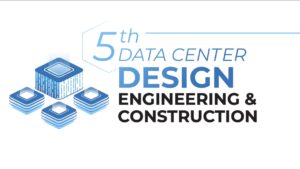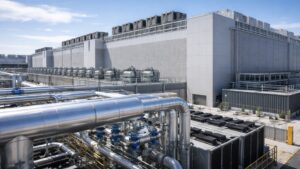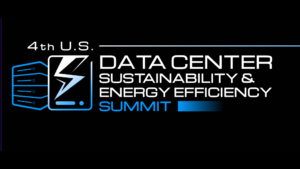The 3rd U.S. Data Center Summit on Construction, Energy & Advanced Cooling was held on May 19-20, 2025, in Reston, Virginia. It converged data center leaders, engineers, designers, and decision-makers to propel the future of data center infrastructure. The two-day event provided critical insights when it comes to sustainable building, energy efficiency, and advanced cooling. This particularly comes in handy in the era of AI and rising demands for computing. Furthermore, participants acquired firsthand information from experts in designing such mission-critical facilities. This is while venturing into the newest developments in a bid to improve resilience. This article goes through key sessions of the summit and highlights the sponsors who made this event valuable and successful.
Sessions at the 3rd U.S. Data Center Summit on Construction, Energy & Advanced Cooling
The conference featured a diverse range of presentations, panel sessions, fireside chats, and roundtable discussions on the most important issues and cutting-edge solutions in the design, build, and operation of data centers. This section presents a rundown of the key sessions that were conducted at the two-day conference:
Sustainable Strategies in the Age of AI
Speaker: Phill Lawson-Shanks, Chief Innovation Officer, Aligned Data Centers
The speaker stressed that even with the virtual explosion of AI computing requests, data centers must maintain their sustainability commitments rather than throwing them out the window. Furthermore, the session underlined the role of hybrid cooling in making energy and water saving feasible in high-density environments. In addition, the session went through how the use of certifications like the Green Building Initiative’s Green Globes can spur green construction and operations. The presenter also supported prefabrication methods to increase sustainability, for it was contended that incremental measures taken now can mean a huge difference in the future ecological footprint of data centers.
Transforming Data Center Construction with AI-Powered Progress Tracking: Why Cupix Leads the Way
Speakers: Ahmad Sabbouri, Director of Professional Services, Cupix; Carolinei Roos, Account Executive, Cupix
The speakers at the 3rd U.S. Data Center Summit on Construction, Energy & Advanced Cooling highlighted how reality capture and AI technologies are transforming data center construction workflows. Through the presentation, the audience understood how intelligent reality capture delivers real-time information across the construction life cycle. This allows project managers to base decisions on data. Additionally, the presenters laid out Cupix’s competitive advantage of AI-powered progress monitoring. So, it emphasized the way such technology helps identify problems before they impact timelines or budgets. As a consequence, it makes construction more efficient and predictable.
The High Cost of Doing Nothing: Why Waiting to Invest in Liquid Cooling is a Risk You Can’t Afford
Speaker: Curtis Breville, Global Head of Liquid Cooling – AI Data Centers, ByteBridge
The talk provided an eloquent argument for investment in liquid cooling technologies for data centers right away. The presenter described the “Price Of Non-Investment” (PONI) methodology. It underlined to the audience that delaying an investment until cooling problems reach a point of criticality is already too late. Moreover, by comparing the top 10 hottest AI chips and dissecting Power Usage Effectiveness (PUE) metrics, the speaker refuted the myth that liquid cooling is prohibitively costly. This highlights that long-term inaction expenses greatly exceed upfront investments in sophisticated cooling infrastructure.
Adapting Data Center Design to Evolving Regulations and Future Growth Needs
Speaker: Dagi Berhane, Senior Director, Global Data Center Architecture & Engineering, Salesforce
The speaker shed light on the best ways of dealing with U.S. guidelines and standards that are changing data center design and operation. Furthermore, the speaker emphasized the importance of creating a flexible, scalable infrastructure. It should be capable of adapting to emerging technologies and future growth requirements. Moreover, the session noted the benefit of including integrated modular design practices for future flexibility and resilience. In addition, it marked the necessity of engaging a variety of stakeholders in the design so that creative, sustainable solutions can be obtained. This helps to satisfy regulatory compliance considerations and operational requirements.
Carlisle Construction Materials for Data Centers
Speaker: John McCall, Senior Strategic Account Manager, Carlisle SynTec Systems
The presentation featured high-specialty construction materials engineered exclusively for use in data center applications. Furthermore, the speaker emphasized the way these materials assist in constructing resilience, energy efficiency, and sustainability for mission-critical facilities. Additionally, utilizing case studies and real-world implementations, the speaker demonstrated how advanced building envelope systems can make a profound impact on the overall performance, operational cost, and environmental footprint of a data center
A Case Study of a Sustainable High-Density Data Center Cooling System
Speaker: Jan Tysebaert, Global General Manager – Data Center Cooling, BAC
With Moore’s law and AI driving the computing density further, the presenter described how future IT hardware needs even more intelligent cooling capabilities. Furthermore, the session outlined different cooling strategies for both in- and out-of-data centers with emphasis on sustainable systems. These can handle the extreme heat loads produced by current AI and high-performance computing workloads. The speaker followed it with a real-life case study.
Integrating Sustainable Water and Cooling Strategies in Data Center Design
Round Table Session
This round table discussion with industry experts provided an exhaustive overview of multiple viewpoints on the sustainable use of water and cooling strategies for data center design. Moreover, the session provided an exchange of best practices, challenges, and innovative solutions for water conservation with effective cooling performance. Further, the session discussed the water-energy nexus of data center operations. It highlighted the technologies and design approaches that reduce the environmental footprint without affecting reliability. The session also presented practical insights into the deployment of water-efficient cooling systems for diverse climate conditions and operational needs.
Optimizing Data Center Cooling with AI: Opportunities & Impact
Speaker: Dr. Niklas Panten, Co-Founder & CEO, etalytics
The talk at the 3rd U.S. Data Center Summit on Construction, Energy & Advanced Cooling presented the potential for disruption by AI in optimizing data center cooling systems. The speaker presented the journey from static to intelligent, adaptive AI-based cooling solutions. He also illustrated the potential of data and digital twins in increasing energy efficiency in cooling operations. Furthermore, special focus was on how AI assists in achieving sustainability objectives using Power Usage Effectiveness (PUE) and Water Usage Effectiveness (WUE) optimization. Workforce issues were also tackled by the presenter in terms of how automation enhances asset monitoring and levels of service agreement, while acknowledging reliability concerns in AI for mission-critical installations.
PANEL DISCUSSION: Managing AI’s Power Demand & Transients: Integrating Energy Storage to Scale AI Data Center Infrastructure
Speaker: Ricardo de Azevedo, Founder & CTO, On.Energy
During this panel discussion, the speaker discussed the issues associated with power management caused by AI computing workloads. Moreover, the speaker presented how energy storage solutions can be utilized by data centers. This is to manage highly variable power loads typical of AI processing. Innovative power management techniques were also discussed that bring stability, efficiency, and resilience to AI-centric data center environments. Additionally, special focus was placed on how energy storage technology can close the gaps between supply & demand peaks and help minimize costs while enhancing operational reliability.
Supply Chain Management and Sustainable Material Procurement in Data Centre Construction
Speaker: Morgan German, Principal Program Manager, Microsoft
During this fireside chat, the speaker at the 3rd U.S. Data Center Summit on Construction, Energy & Advanced Cooling shared the imperative need for sustainable supply chain management in data center development. The discussion touched on sustainable procurement strategies for obtaining environmentally friendly materials. This is without jeopardizing quality and performance levels. In addition, the speaker drew lessons from Microsoft’s experiences of incorporating sustainable procurement into their business and the resulting environmental/ operational gains that were achieved. As a consequence, participants learned firsthand about how to assess suppliers, formulate sustainability parameters, and incorporate these into the building process without infringing on project timelines and budgets.
AI In The Data Center: The Impact on Cooling and Power Design
Speaker: Justin Jurek, Sales Director, HITEC Power Protection
The presentation covered the deep implications of AI deployment in data center cooling and power infrastructure. The speaker discussed how rising rack densities and anomalous power consumption patterns pose new design issues, especially thermal runaway risk in servers and battery rooms. Moreover, the speaker discussed methods to protect bigger critical mechanical facilities powering AI operations and talked about how to address the enormous gigawatt-scale power demands of current AI data centers. The talk also assessed whether conventional power protection solutions are still tenable for GPU electrical load profiles.
Powering Generative AI: Exploring Reliable and Sustainable Energy Solutions for Data Centers
Speaker: Cora Nogueira, ESG & Real Estate Manager, Elea Data Centers
This fireside chat examined the confluence of generative AI’s increasing power requirements and green power solutions. Furthermore, the presenter addressed ways to satisfy the intense power needs of AI workloads. This is while keeping environmental promises. The discussion covered revolutionary methods of energy sourcing, on-site generation, and efficiency optimization tailored to AI-centric data centers. So, participants learned about balancing performance requirements with sustainability ambitions in the fast-changing generative AI deployment landscape.
Skills-Based Job Matching for Workforce Sustainability
Speaker: Courtney Popp, Director of People Programs, iMasons Climate Accord
The speaker at the 3rd U.S. Data Center Summit on Construction, Energy & Advanced Cooling covered the essential topic of workforce development within the data center sector. The session discussed the potential for skills-based job matching to enable organizations to create sustainable talent pipelines. This is while providing career opportunities for diverse candidates. The presenter also discussed models for the identification of transferable skills from neighboring industries and the design of targeted training programs to close existing skill gaps. So, the talk reinforced workforce sustainability as a critical element of the industry’s overall sustainability initiative and long-term stability.
Enhancing Clean Energy Accessibility in U.S. Demanding Markets
Speaker: Richard Hallahan, Head of Solutions Engineering, CleanArc Data Centers
The presentation emphasized strategies for increasing clean energy access throughout the United States, with a focus on high data center concentration markets. Furthermore, the presenter discussed key energy issues confronting the industry and defined strategies for promoting clean energy adoption in the face of varying market dynamics. Specific emphasis was placed on the changing environment of PPAs and how they can be used to obtain renewable energy to power data centers. As a result, participants learned from each other on how to overcome regional variations in energy markets while achieving sustainability objectives.
Building the Future: Energy-Efficient Construction Practices for Next-Gen Data Centers
Round Table Session
This interactive session combined different viewpoints on energy-efficient construction practices for future-oriented data center buildings. Moreover, participants exchanged strategies on building envelope architecture, material selection, and construction techniques. These reduce embodied carbon and operational energy usage. Additionally, the round table delved into the interaction between construction methods and long-term sustainability performance. It showed methods that weigh initial expense against lifecycle advantage. As a result, participants acquired hands-on knowledge transferable to new builds and refurbishments of all sizes and geographical locations.
Retrofitting, Reusing, Reducing and Modernizing Data Centers for Efficient AI Infrastructure
Speaker: Joel Tshite, Sr. Data Center Build Engineer, Oracle
The session at the 3rd U.S. Data Center Summit on Construction, Energy & Advanced Cooling discussed the opportunities and challenges of retrofitting current data center facilities to support AI workloads. The presenter discussed techniques for retrofitting and optimizing current infrastructure to provide high-density AI computing without calling for entirely new buildings. The session also discussed unique solutions to increasing legacy data center energy efficiency. This ranges from upgrades to cooling systems to power management technology. Additionally, specific focus was placed on financing modernization ventures and balancing capital expenditures.
3rd U.S. Data Center Summit on Construction, Energy & Advanced Cooling: Who Were The Sponsors?
The summit was successful due to the participation of industry leaders as sponsors. They shared their expertise/ resources to make the experience worthwhile for everyone present. These organizations are the leaders in data center technology, construction, cooling, and energy management solutions. This section puts the limelight on these sponsors:
ByteBridge – Silver Sponsor
ByteBridge is a minority-owned Hayward, California-based IT solutions company. Having begun as a spinoff of a world-respected IT company later purchased by a Fortune 200 business, ByteBridge specializes in data centers, enterprise IT, and unified communications. Furthermore, their vision, “Bridging Visions, Shaping Futures,” informs their mission to enhance global access to technology. At the 3rd U.S. Data Center Summit on Construction, Energy & Advanced Cooling, ByteBridge provided insights into liquid cooling approaches for AI data centers. It came with an emphasis on the cost implications of postponed upgrades and the advantages of early planning in high-density scenarios. So, this made way for the operators to improve efficiency as well as financial performance.
Etalytics – Bronze Sponsor
Established in 2020 at TU Darmstadt, Germany, Etalytics provides AI-driven solutions. It optimizes global energy consumption, emissions reduction, and minimization of operational expenditure. Furthermore, their product, etaONE, offers real-time analytics and predictive intelligence in multiple industries. It includes data centers, pharma, and automotive. During the summit, Etalytics showed how digital twins and machine learning make cooling system response more dynamic. Moreover, their presentation showed how dynamic, data-driven approaches could substitute static controls to allow energy efficiency while enhancing performance. Participants learned actionable strategies for intelligent cooling operations that are aligned with both sustainability goals and technical performance objectives.
Baltimore Aircoil Company (BAC) – Bronze Sponsor
Baltimore Aircoil Company (BAC) provides global cooling and thermal energy solutions. It includes evaporative, adiabatic, and hybrid for industrial processes, HVAC applications, & refrigeration requirements. Additionally, recognized for minimizing energy and water consumption, BAC creates systems from initial concept to eventual long-term service. During the 3rd U.S. Data Center Summit on Construction, Energy & Advanced Cooling, BAC gave a real-world case study of sustainable high-density data center cooling. Their data-driven discussion also showcased water-efficient technologies that manage rising thermal loads while meeting environmental demands. Attendees learned how advanced cooling solutions perform under real conditions, offering strategies for improved system reliability and sustainability.
Carlisle SynTec Systems – Bronze Sponsor
Carlisle SynTec Systems is a Pennsylvania-based company. It has provided high-performance single-ply roofing systems for more than 50 years. Moreover, as part of Carlisle Construction Materials LLC, it has U.S.-wide manufacturing facilities producing durable, sustainable solutions for commercial and mission-critical buildings like data centers. At the summit, Carlisle shared facts on how top roofing and insulation products contribute to enhanced data center energy efficiency and building strength. As a result, attendees gained insight into the performance function of building envelopes and how the selection of smart materials leads to increased sustainability while protecting important assets from environmental degradation.
Cupix – Bronze Sponsor
Cupix provides the construction industry’s most flexible 3D digital twin software. It enables users to record and explore job sites with mobile apps and 360-degree cameras. Additionally, their cloud-based technology facilitates real-time tracking, BIM comparison, measurements, and annotations. During the summit, Cupix demonstrated how AI-driven digital twins enhance data center construction management. Their session encapsulated real-time monitoring, which helps teams detect problems early on, minimize delays, and streamline intricate projects. This provided attendees with actionable resources for gaining better visibility.
HITEC Power Protection – Presenting Partner
HITEC Power Protection is headquartered in Almelo, the Netherlands, and has support centers around the USA and Asia Pacific. It provides reliable, uninterrupted power via its PowerPRO 2700 and PowerPRO3600 Dynamic Rotary UPS systems. Moreover, its solutions, from 415V to 34.5kV, serve critical IT and cooling infrastructures. At the 3rd U.S. Data Center Summit on Construction, Energy & Advanced Cooling, the company discussed cooling and power design strategies for AI-based data centers. It came with a particular focus on issues with variable loads and high-density computing environments. Their talk armed participants with strategies to create robust, efficient, and eco-friendly power infrastructure that can sustain next-generation digital workloads.
On Energy – Panelist Partner
On Energy is a battery storage IPP offering grid-interactive systems for utilities, critical infrastructure, and AI data centers in six nations. Furthermore, with more than 40 installed projects and 1 GWh in construction, their solution combines patented medium-voltage UPS, sophisticated energy software, and in-house engineering. At the summit, On Energy contributed to a panel on managing AI power demand & transients. The company went through how energy storage can manage changing loads and transient mitigation. Their presentations helped attendees see the value of combining battery systems in enhancing power dependability, enabling sustainability, and increasing grid flexibility in next-generation facilities.
To Sum Up
The 3rd U.S. Data Center Summit on Construction, Energy & Advanced Cooling provided outstanding value through leading-edge information on sustainable building, energy efficiency, and state-of-the-art cooling solutions. As the sector keeps developing rapidly with AI pushing demands, it is not only good but necessary to keep up with the best practices and new technology for competitive success.
Industry experts must attend upcoming sustainability-oriented events to stay ahead of the curve in terms of innovation, establish worthwhile connections with industry influencers, and acquire the knowledge necessary to translate cutting-edge strategies into practices that serve both performance and the environment.




